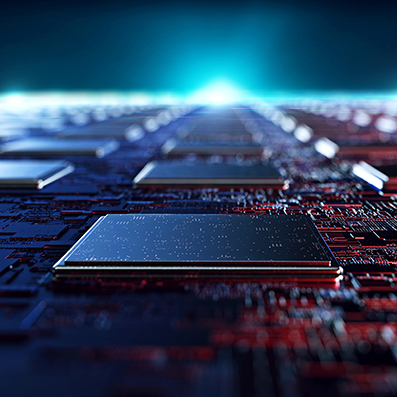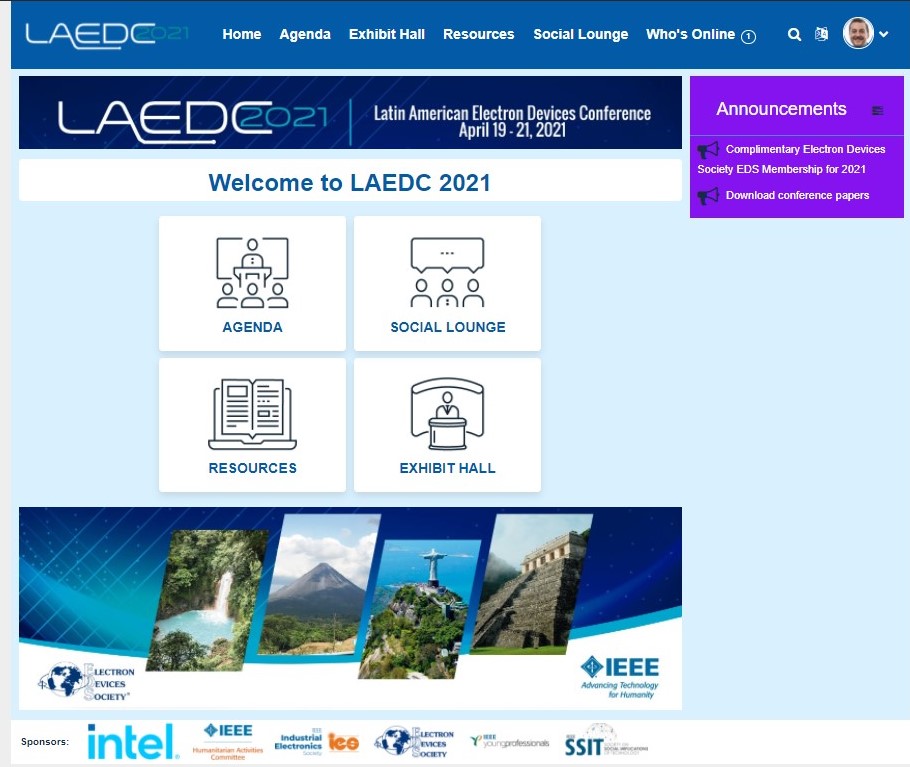
Filed in: Virtual & Hybrid Event Case Studies Tag: Case Studies
 The 2021 IEEE Latin America Electron Devices Conference (LAEDC) was held virtually from 19-21 April 2021. Sponsored by the IEEE Electron Devices Society (EDS), the event brings together specialists from all Electron Device-related fields, with an emphasis on students and young researchers. Approximately 189 participants joined the 2021 virtual event.
The 2021 IEEE Latin America Electron Devices Conference (LAEDC) was held virtually from 19-21 April 2021. Sponsored by the IEEE Electron Devices Society (EDS), the event brings together specialists from all Electron Device-related fields, with an emphasis on students and young researchers. Approximately 189 participants joined the 2021 virtual event.
Chair Mario Aleman and the LAEDC Organizing committee opted for a DIY (Do-It-Yourself) approach to organizing their virtual event. To bridge any gaps, the committee brought in the MCE Digital Events Team for some light support that included integration of a second virtual tool, agenda management and production, communication with support staff, interaction with participants and authors, website, and social media promotion.
To capture the excitement of a live event while minimizing the likelihood of technical difficulties, the organizing committee employed a simu-live format. Authors submitted their video presentations in advance of the event, which were then played at scheduled times during the program. Authors were online and available directly following their presentations to engage in QA sessions with participants. The approach created a seamless participant experience while providing opportunities for meaningful engagement.
The team selected the tools and platforms that would best support LAEDC’s robust technical program and interactive sessions. To create a polished virtual experience, the team used the Engagez platform as the landing page for the event. Organizers used the platform’s announcements feature to communicate with attendees and inform them of upcoming sessions. For optimal control, the team broadcast presentations through the Webex application, moving right into Q&A after the completion of each video. The team also integrated their Cvent registration system with Engagez using the Zapier application for a more seamless user experience.
To broaden access to the event, organizers offered several sessions free of charge the day before their opening ceremony. These included several workshops by MOS-AK on topics like using open-source CAD software for circuit simulation and memristor modeling. The day also featured a panel session on humanitarian technology and a poster/project session. After the closing ceremonies, participants could also join a free INTEL & Women in Engineering (WIE) Networking Session for a talk on the value of women engineers in today’s marketplace.
LAEDC offered scholarship opportunities to encourage participation from undergraduate and graduate students. To be considered, students could submit an online application to have their registration fee waived. Student authors received priority in obtaining these scholarships.
LAEDC’s program included a diverse mix of three keynotes and 69 technical presentations. Keynote speakers addressed game-changing topics like “Can Solar PV Save the World?” Technical presentations paved the way for exciting discussions on the future of electron devices with topics like “Fully Printed Flexible Internet-of-Things Nodes with Energy Scavenging and Non-toxic Energy Storage” and “The Endless Advances of Nanoelectronics.” Presented papers will be available in the IEEE Xplore® Digital Library following the event.
Organizers used the Engagez platform’s analytics tool to gain insight into participant engagement at the event and created new experiences with live sessions with more than 350 participants joining the keynote and plenary sessions. The event was well-attended during the four days including technical and networking sessions.
LAEDC is a great example of how with the right planning, an organizing committee can host a fantastic virtual event with minimal support. Aleman shares, “Our volunteers did a great job in putting the event together. We were glad to have the opportunity to offer our third LAEDC event virtually to continue exciting advancements in the area of electron devices.”